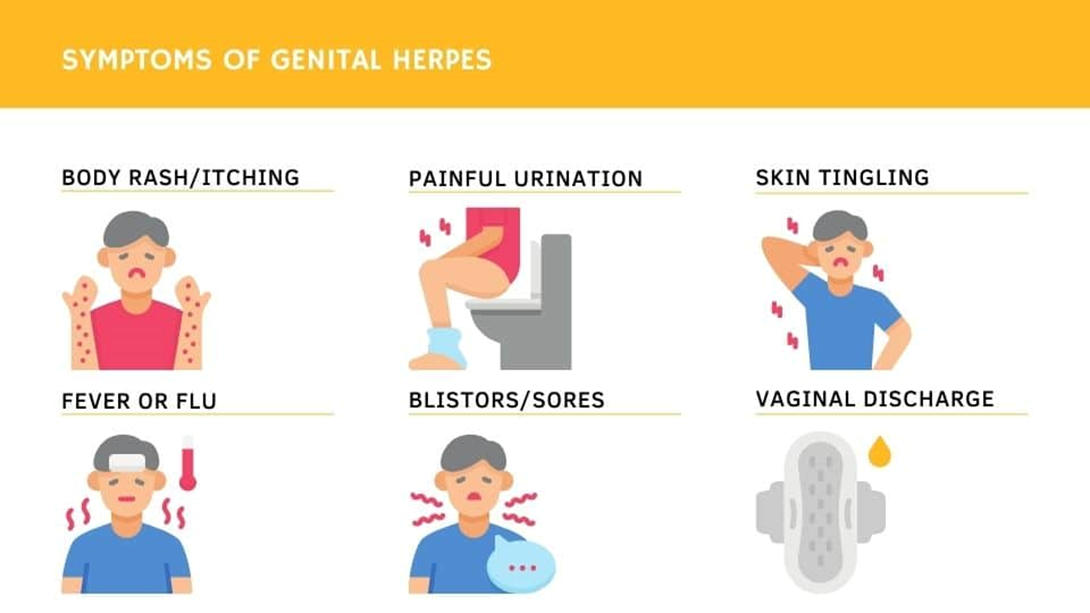A nurse is providing discharge teaching for a client who is receiving treatment for genital herpes. Which of the following statements by the client indicates the effectiveness of the teaching?
"I should apply antibiotic ointment to the lesions."
"I should use natural skin condoms during sexual intercourse."
"I should expect my lesions to resolve in 6 weeks."
"I should expect to take my medication for 3 weeks."
The Correct Answer is D
Choice A reason: Applying antibiotic ointment to the lesions is not recommended for the treatment of genital herpes, which is caused by a virus, not bacteria. Antiviral medications are the appropriate treatment for managing herpes outbreaks.
Choice B reason: Natural skin condoms are not effective in preventing the transmission of genital herpes because the virus can pass through the natural membrane. The use of latex or polyurethane condoms is recommended as they are more effective in reducing the risk of transmission.
Choice C reason: Expecting lesions to resolve in 6 weeks may not be accurate as the duration of a herpes outbreak can vary. Most herpes lesions tend to resolve within 2 to 4 weeks. However, the virus remains in the body and can cause recurrent outbreaks.
Choice D reason: The duration of medication for genital herpes depends on whether the treatment is for an initial outbreak, chronic suppression, or episodic therapy. For an initial outbreak, antiviral medication is typically taken for 7 to 10 days. For chronic suppression, medication might be taken daily for an extended period to prevent or reduce the frequency of outbreaks.

Nursing Test Bank
Naxlex Comprehensive Predictor Exams
Related Questions
Correct Answer is D
Explanation
Choice A reason: While it is generally advised to avoid taking blood pressure readings from an arm with a PICC line to prevent complications, if the right arm cannot be used, as may be the case with the other clients listed, the nurse may have to use the left arm with extreme caution, ensuring not to disrupt the PICC line.
Choice B reason: Bell's palsy affects facial nerves and does not typically impact the measurement of blood pressure. Therefore, there is no contraindication to using the left arm for a blood pressure reading in a client with left-sided Bell's palsy.
Choice C reason: A client with right-sided weakness due to Parkinson's disease can have their blood pressure taken on the left side if the right side is too weak to provide an accurate reading or if using the right side would cause discomfort to the client.
Choice D reason: For a client with a right upper extremity arteriovenous fistula, typically created for dialysis access, blood pressure measurements should not be taken on that arm to avoid damaging the fistula. Therefore, the left arm should be used for blood pressure readings in this case.
Correct Answer is ["B","C","E"]
Explanation
Choice A reason:Frequent exposure to low-volume noise is not typically a risk factor for hearing loss. Hearing loss is more commonly associated with prolonged exposure to high-volume noise, which can damage the delicate structures within the ear.
Choice B reason: Chronic infections of the middle ear, such as chronic otitis media, can lead to hearing loss. These infections can cause persistent inflammation and fluid buildup, which may damage the middle ear structures over time, leading to conductive hearing loss.
Choice C reason: Perforation of the eardrum, or a ruptured eardrum, can result in hearing loss. The eardrum is essential for the proper conduction of sound waves to the inner ear. A perforation disrupts this process and can reduce hearing ability until the eardrum heals or is surgically repaired.
Choice D reason: Being born with a high birth weight is not a known risk factor for hearing loss. Hearing loss at birth is more commonly associated with genetic factors, prenatal and perinatal infections, and complications during birth.
Choice E reason: The use of a loop diuretic can be a risk factor for hearing loss. These medications can have ototoxic effects, especially when administered in high doses or with rapid intravenous infusion, potentially leading to temporary or permanent hearing loss.
Whether you are a student looking to ace your exams or a practicing nurse seeking to enhance your expertise , our nursing education contents will empower you with the confidence and competence to make a difference in the lives of patients and become a respected leader in the healthcare field.
Visit Naxlex, invest in your future and unlock endless possibilities with our unparalleled nursing education contents today
Report Wrong Answer on the Current Question
Do you disagree with the answer? If yes, what is your expected answer? Explain.
Kindly be descriptive with the issue you are facing.
